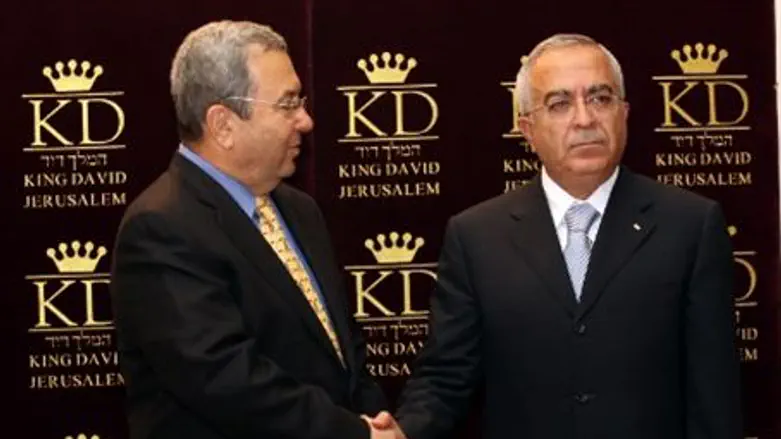
Defense Minister Ehud Barak says it is likely that Prime Minister Binyamin Netanyahu will agree to divide Jerusalem with the Palestinian Authority.
Barak told the Hebrew-language newspaper Haaretz in an interview published Wednesday that he believes the best chance for peace lies in a peace deal in which all the Arab neighborhoods in Jerusalem would be handed over to the PA in order to create a capital for a new Arab country.
“If Netanyahu leads a process, a significant number of rightist ministers will stand with him,” he told the newspaper. “So what is needed is courage to make historic, painful decisions. I'm not saying that there is certainty for success, but there is a chance. This chance must be exploited to the fullest.”
The peace plan described by Barak includes the following:
* two states for two nations
* an end to the conflict and the end of all future demands
* demarcation of a border “that will run inside the Land of Israel” dividing a demilitarized PA state from an Israel that includes the “settlement blocs”
* retrieving and relocating the “isolated settlements” into the settlement blocs or within Israel
* a solution to the refugee problem within the PA state, or rehabilitating them through international aid
* comprehensive security arrangements
* a “solution to the Jerusalem problem.”
As for the “Jerusalem problem,” Barak told the newspaper that the western side of the city plus "12 Jewish neighborhoods that are home to 200,000 residents will be ours.” The neighborhoods in which nearly 250,000 Arabs are living “will be theirs.”
In addition, Barak envisions a “special regime” with “agreed-upon arrangements” to administer the Old City, the Mount of Olives and the City of David.
The concept is similar to one raised in the past by the administration of former U.S. President Bill Clinton, who recommended the area, which he referred to as the “Holy Basin,” be internationalized under a “special regime.”
Prior to his re-election as Israel's prime minister nearly two years ago, Binyamin Netanyahu warned a gathering at the Jerusalem Conference in January 2009 that leftist politicians would try to internationalize the holy sites in Jerusalem – and he vowed to fight the move.
“Some politicians are trying to blur the importance of the Temple Mount to the Jewish People by referring to it as the 'Holy Basin',” he told the crowd at the time. “We, as Jews, know who built the Temple Mount.”
Netanyahu promised the packed hall, “We have demonstrated in the past, and will continue to demonstrate our commitment to a complete, undivided Jerusalem... Everyone knows what will happen if we were to leave those areas and divide Jerusalem. Someone will enter – and that someone will be Hamas.”
Meanwhile, Barak told Haaretz that Tuesday night's murderous attack by Hamas terrorists was “a very serious incident, the likes of which we haven't seen for a long time.”
Four Jews -- two men and two women, one of whom was nine months pregnant -- were shot to death by a Hamas terrorist cell on Highway 60 at the Bani Nayim junction, between the Jewish community of Pene Hever and Hevron just as darkness fell, ending the daily Muslim fast of Ramadan. According to security sources, the terrorists had "confirmed the kill" by approaching the car and firing at point-blank range once the victims were already either seriously wounded or dead. Ten children were orphaned by the attack.
Barak countered demands by outraged politicians and community leaders for Netanyahu to return from Washington, saying the attack had “no doubt” been an attempt to “harm the start of the peace talks” and urged Israelis to support the process.